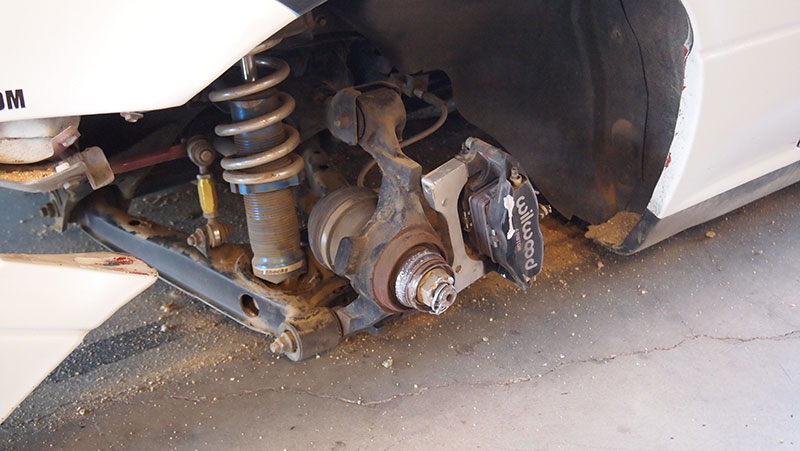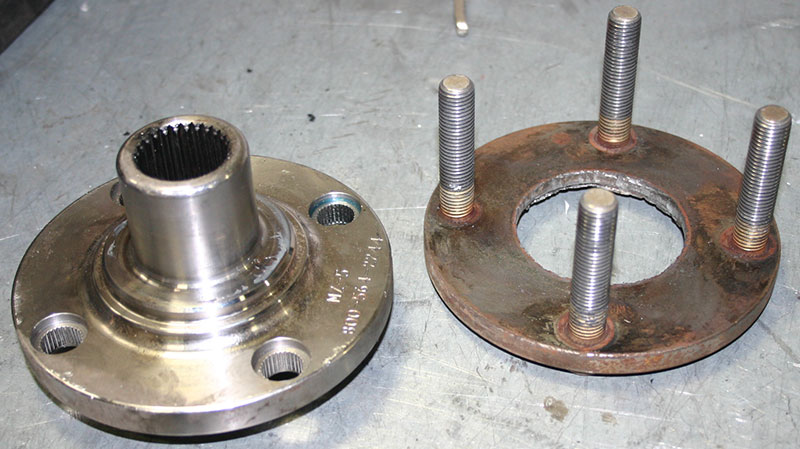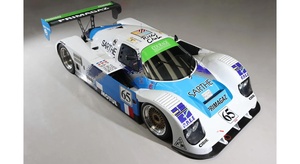
Tom Suddard
Director of Marketing & Digital Assets
11/3/23 8:40 a.m.

Nobody likes it when the wheels fall off their race car. And sadly, the wheels on our V6-powered Miata wanted to come loose.
We had already taken a step to fix this, as we had ditched our Miata’s stock fragile front hubs for a redesigned aftermarket setup featuring user-serviceable tapered …
Read the rest of the story
Seems like an upgrade worth every penny.
No one wants to be that guy that flags a session because their wheel came loose.
Hopefully you'll be paying enough attention that it doesn't go that far :) The first year I was a mechanic on a Thunderhill 25 team, we went through a lot of hubs. The team didn't quite understand how badly they'd get beaten up. I think we might have lost one wheel, but it's been more than a decade and I forget what happened exactly at 1am.
There are few upgraded hubs available on the market. A budget option is to go to a blueprinted stock unit. That's what we used the second year at Thunderhill, and none of the four cars on our team had a hub failure. There are also modified E30 hubs from Brofab, and Mazda Competition offers an tapered bearing option as well. Two of those choices are available from my favorite Miata vendor :)

NickD
MegaDork
11/3/23 11:48 a.m.
I did this on an aftermarket replacement hub at an autocross. Ripped the face of it apart at the top of 2nd gear in a slalom. That was.....thrilling.



Noddaz
PowerDork
11/3/23 11:51 a.m.
In reply to NickD :
That is down right scary.
Should I be concerned on a stock street only Miata? Or just inspect at brake jobs.
The usual concern with Miata front hubs is bearing failure, not so much flange failure. That's why a few of the upgrade options like the Miatahubs run tapered bearings.
But there are a bunch of aftermarket stock replacement hubs with slightly different castings, some of which have proven to be insufficient to the task as they have built-in stress risers. I've seen more rear wheel drive flange failures myself, including one on my own car.

Tom Suddard
Director of Marketing & Digital Assets
11/3/23 12:08 p.m.
Yeah, I'll second what Keith said. OEM hubs are usually fine as far as flanges go, but the bearings don't last very long. But some of the cheap aftermarket replacements can explode like that. That's one reason I replaced every hub on my 350Z with new replacements from the dealer when I had the suspension apart--at 200,000 miles, I wanted to make sure I wasn't racing on the cheapest stuff the previous owner bought at the parts store.

NickD
MegaDork
11/3/23 12:51 p.m.
Keith Tanner said:
The usual concern with Miata front hubs is bearing failure, not so much flange failure. That's why a few of the upgrade options like the Miatahubs run tapered bearings.
But there are a bunch of aftermarket stock replacement hubs with slightly different castings, some of which have proven to be insufficient to the task as they have built-in stress risers. I've seen more rear wheel drive flange failures myself, including one on my own car.
Also didn't help that this is a 250whp car on 245-width Super 200TW tires that gets autocrossed heavily. I may have been exceeding the design expectations just a little bit. I had chewed through a bunch of the bearings and usually just put a set of hubs in the front. That was the first, and only time, that it ever did that. Of course, I had just installed Wilwood calipers on the front and it ground the rotor into one of the brand-new calipers. Fortunately another autocrosser had a spare bearing on hand and we put a wheel bearing in this thing in like 15 minutes and didn't even miss a run.
I don't remember the brand FM used to sell, but 10 years ago with my NA, we killed both fancy front hubs in one track day (I was sharing the car with a friend so we it went through like 13 sessions in one day).
What was going on with the loosening hubs? Settling or sinking races? Crazy wear of actual bearing surfaces?
I'm having trouble getting my head around an excess-clearance failure mode that can be even temporarily resolved by adjustment...
These hubs are great! Within a handful of races, they paid for themselves.
Racing in Champcar, we were losing at least one hub, usually multiple every race. We tried all the vendors for the stock hubs and it didn't make a difference. All bearing failures.
Haven't had a single failure since we got the MiataHubs hubs. A few races after getting them, I realized how much less stress I felt during the race. Before, I was always waiting for the hub failure, had to be ready to change it at any minute. All that went away.
Jesse Ransom said:
What was going on with the loosening hubs? Settling or sinking races? Crazy wear of actual bearing surfaces?
I'm having trouble getting my head around an excess-clearance failure mode that can be even temporarily resolved by adjustment...
Think trailer bearings. The Miatahubs aren't replacing stock, they're replacing "a redesigned aftermarket setup featuring user-serviceable tapered roller bearings." I wonder if the nut was loosening off? Ideally they should be replaced every time they're removed, as they're staked.
z31, FM has sold a few different hubs over the years including the Miatahubs. At least one of them isn't on the market anymore - or maybe it never made it through our testing.
In reply to Keith Tanner :
Yeah, I don't remember the exact brand, they were sold with ARP studs already installed. But this was Hallett before it was mostly repaved, and we hammered the curbs looking for time.
It's mentioned above that bearing failure is more common than flange breakage, and that's true. However, as you go up in wheel width and tire grip, flange breakage becomes a more immediate concern and I've seen a number of failures reported online. Overall probability may be low but severity is high so it's important to get tough hubs and check them regularly if you're running sticky 285 tires on a Miata.
Ah, hub failures bring back some painful memories.. I was crewing in 25hrs of Thunderhill back in 2013 and while leading the class by a healthy margin lost a rear wheel due to a hub failure. Still managed to finish second only to be disqualified for being underweight as a result of the parts that had fallen off the car during that off. If I remember correctly turns out the car could have been classed at the next power-to-weight category and still would have been ok and would not have been DQ'd. Oh well...
Speedhunters was capturing that event and managed to get some shots of the incident: http://www.speedhunters.com/2013/12/25-hours-thunderhill-art-endurance-racing/


Certainly an attention getting article for a Miata owner. I run a 99 sport in E Street autocross, and drive to events, sometimes hundreds of miles. Zero track use.
I just topped 120k miles. Is there potential for hub failure for this level of performance? What are the signs of failure, short of losing a wheel? Inspection is easy if I know what to look for, I change tires every event.
Aftermarket hubs would not be class legal for me, but a set of blueprinted stock ones would be, and would just require a call to my favorite Miata parts vendor.
Is there an a case to be made for me to get extended studs?

Keith Tanner said:
Jesse Ransom said:
What was going on with the loosening hubs? Settling or sinking races? Crazy wear of actual bearing surfaces?
I'm having trouble getting my head around an excess-clearance failure mode that can be even temporarily resolved by adjustment...
Think trailer bearings. The Miatahubs aren't replacing stock, they're replacing "a redesigned aftermarket setup featuring user-serviceable tapered roller bearings." I wonder if the nut was loosening off? Ideally they should be replaced every time they're removed, as they're staked.
z31, FM has sold a few different hubs over the years including the Miatahubs. At least one of them isn't on the market anymore - or maybe it never made it through our testing.
When I see preloaded bearings get replaced with adjustable tapered bearings, I mentally shout "NOOOO!!!!!"
One major, major advantage to a preloaded bearing, where you tighten the spindle nut down to a fairly high torque, is that the spindle ends up being loaded in tension. Forces on the hub trying to bend the spindle will have to stretch the spindle. It's a very strong connection.
When you have tapered bearings that do not have any kind of preload sleeve between the two inner races, and therefore the adjuster nut is not really torqued to anything, the spindle can bend fairly easily. This can lead to fatigue cracks and the eventual loss of the spindle from the upright, but it will first manifest as an inability to keep the bearings adjusted well because they are no longer running in the same plane when the whole assembly flexes, so they wear quickly.
Ahem.
Another way that adjustable tapered bearings are not the best is that there has to be some clearance, however small, between the inner races and the spindle. Because they are not torqued down and thus are free to move, the inner races will rotate on the spindle, and wear this clearance wider, as well as wearing all of the other surfaces. You can readjust for the other surfaces, but the diametrical clearance can't be adjusted out, and you end up with bearings that can be both overly tight, and have a measurable amount of radial play in the wheel. The play isn't in the bearings, it's between the bearings and the spindle. This used to give me fits when I would go up to Detroit SCCA events because they tech wheel bearings, and it was always a "discussion" about how adjustable wheel bearings always have play, have to have play...

Floating Doc (Forum Supporter) said:
Certainly an attention getting article for a Miata owner. I run a 99 sport in E Street autocross, and drive to events, sometimes hundreds of miles. Zero track use.
I just topped 120k miles. Is there potential for hub failure for this level of performance? What are the signs of failure, short of losing a wheel? Inspection is easy if I know what to look for, I change tires every event.
Aftermarket hubs would not be class legal for me, but a set of blueprinted stock ones would be, and would just require a call to my favorite Miata parts vendor.
Is there an a case to be made for me to get extended studs?
This conversation is including two separate causes of failure: bearing failure and flange failure.
For bearing failure, look for play in the wheel. It's a gradual thing. You'll probably also notice knockback as it gets worse. This is mostly a front wheel thing and has been a weak point in Miatas running sticky tires for a long time. I'm pretty sure this is the primary reason for the various upgrades available.
For flange failures, look for cracks on the backside. This wasn't a problem for a very long time until stock parts being used hard started aging out, especially in the rear. The arrival of substandard aftermarket replacements for both ends didn't help.
I've lost a rear wheel due to a poorly designed aftermarket hub flange coming apart. No warning, just the outside rear wheel coming off at the apex of T9 at Laguna Seca. The hub had some serious stress risers built into the design. This hub is also no longer on the market :) I think it's the only time I've been returned to the pits on a truck.


Within a week or two of my failure, there were two other identical failures of stock drive flanges on track Miatas. At least one was original to the car. We contacted Mazda Motorsports with a suggestion for an upgraded part, they said "they never break, it's not a problem" and then put a rear hub replacement kit on the front page of their site.
I remember a big discussion on this topic on a different forum. The most common cause of flange failures was using aftermarket hubs; some of them had a machined step-off on them that acted like a stress riser. Eventually someone got a hold os Centric who actually took steps to fix it, although they were difficult to figure out. Their "standard" hubs had the machined step, and their "premium" hubs were more like OE and did not. I didn't follow the story long enough to know if the premium ones are actually more durable. There were also some hub failure from people pressing in aftermarket lugs and doing a sloppy job, creating stress risers that cause cracks starting in the lug holes.
AFAIK these were all fatigue related failures, so frequent inspection should greatly mitigate issues.
In reply to Pete. (l33t FS) :
I get what you are saying. However properly set up tapered rollers have a load capacity multiple factors of the same size ball bearing, millions of hours of operation versus thousands or even hundreds or less than 25.  As long as the spindle is sufficiently strong, this should work fine. One thing to watch out for is that the failure mode could move upstream. It might be a good idea to magnaflux the spindles at some frequency to check for cracking. Just thinking out loud...
As long as the spindle is sufficiently strong, this should work fine. One thing to watch out for is that the failure mode could move upstream. It might be a good idea to magnaflux the spindles at some frequency to check for cracking. Just thinking out loud...
Just curious, so SKF doesn't make a Tracker X hub for the front of the Miata, like the ones you used on the latest C5 Corvette project car?
In reply to deaconblue :
These MiataHubs.com hubs are the ones you are likely thinking about, they were developed in partnership with SKF's Racing division

te72
HalfDork
9/24/24 9:34 p.m.
Anyone ever run into hub failure on an Exocet? I autocross mine as often as I can, on A052's, but I purposely keep them skinny to develop the car progressively.
My thinking is that a 1600 lb car has a lot less stress put into, well... everything. The donor was almost entirely a commuter for its unfortunately short life.
So what's the consensus on the best rear hub/bearing combo for endurance racing Miatas?
I posted this in another thread but got to experience it first hand this weekend. https://www.youtube.com/watch?v=XQBkCUJIqDA
I also have an NA that I purchased a while back that I'm slowly building as a second car for our team and want to avoid that happening to my car.

I've never seen as many rear hub failures as I've seen at Harris Hill in San Marcos. The first time I ever raced there, the team I was with had brand new hubs from Rock Auto. We lost the right rear on Saturday, the left rear on Sunday. This past weekend, there were 4 cars that lost a rear, one car twice, and their team car had one. I don't remember which team had their wheel come off on the backstretch, bounce over the fence and cross the highway. Luckily, no cars were driving past at the time.
At Texas World Speedway in 2015, we replaced the right front hub right before the start of Sunday's race. At the end of five hours, that hub had way more play in it than the one it replaced. It started making horrendous noises the last two laps of my stint. The owner got in the car and drove it the last two hours, gaining us a spot to finish third in GP3. I still have video on my phone of the car in impound, and me pushing the top of the tire with my foot, and getting at least an inch of movement at the top of the tire.








































